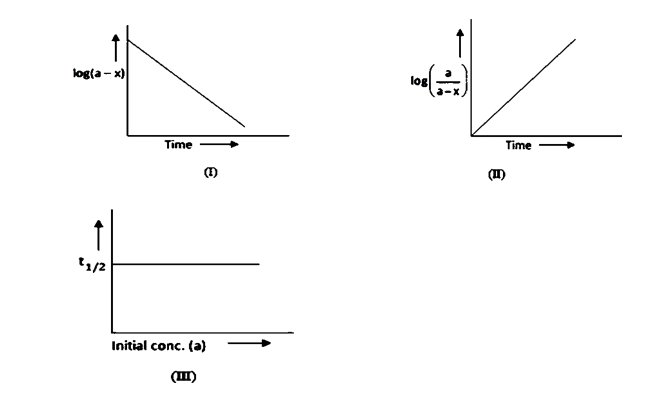Which of the following is (are) not correct for a first order reaction?
t1/2∝a
t1/2∝1/a
t1/2∝a0
t1/2∝a2
The correct Answer is:A, B, D
To determine which statements are not correct for a first-order reaction, we need to analyze the properties and equations associated with first-order kinetics.
1. Understanding First-Order Reactions:
- A first-order reaction is characterized by a rate that is directly proportional to the concentration of one reactant. The general form of the rate law for a first-order reaction can be expressed as:
Rate=k(A)
where k is the rate constant and (A) is the concentration of the reactant.
2. Half-Life of a First-Order Reaction:
- The half-life (t1/2) of a first-order reaction is given by the formula:
t1/2=0.693k
- Importantly, this expression shows that the half-life is independent of the initial concentration of the reactant.
3. Analyzing the Options:
- We need to evaluate the statements provided in the options regarding the half-life of a first-order reaction:
- Option A: t1/2 is directly proportional to (A)1 (Incorrect)
- Option B: t1/2 is directly proportional to (A)0 (Correct)
- Option C: t1/2 is independent of concentration (Correct)
- Option D: t1/2 is directly proportional to (A)2 (Incorrect)
4. Identifying Incorrect Statements:
- From our analysis:
- Option A is incorrect because t1/2 is not proportional to (A)1.
- Option B is correct because t1/2 is proportional to (A)0 (which is 1).
- Option C is correct as t1/2 is independent of concentration.
- Option D is incorrect because t1/2 is not proportional to (A)2.
5. Conclusion:
- The statements that are not correct for a first-order reaction are A and D.
Final Answer:
The incorrect statements for a first-order reaction are A and D.
---
- A first-order reaction is characterized by a rate that is directly proportional to the concentration of one reactant. The general form of the rate law for a first-order reaction can be expressed as:
Rate=k(A)
where k is the rate constant and (A) is the concentration of the reactant.
- The half-life (t1/2) of a first-order reaction is given by the formula:
t1/2=0.693k
- Importantly, this expression shows that the half-life is independent of the initial concentration of the reactant.
- We need to evaluate the statements provided in the options regarding the half-life of a first-order reaction:
- Option A: t1/2 is directly proportional to (A)1 (Incorrect)
- Option B: t1/2 is directly proportional to (A)0 (Correct)
- Option C: t1/2 is independent of concentration (Correct)
- Option D: t1/2 is directly proportional to (A)2 (Incorrect)
- From our analysis:
- Option A is incorrect because t1/2 is not proportional to (A)1.
- Option B is correct because t1/2 is proportional to (A)0 (which is 1).
- Option C is correct as t1/2 is independent of concentration.
- Option D is incorrect because t1/2 is not proportional to (A)2.
- The statements that are not correct for a first-order reaction are A and D.
The incorrect statements for a first-order reaction are A and D.
Topper's Solved these Questions
- CHEMICAL KINETICSBOOK - CENGAGE CHEMISTRY ENGLISHCHAPTER - CHEMICAL KINETICSEXERCISE - Exercises Single Correct
177 Videos
- CHEMICAL KINETICSBOOK - CENGAGE CHEMISTRY ENGLISHCHAPTER - CHEMICAL KINETICSEXERCISE - Exercises Assertion-Reasoning
22 Videos
- CHEMICAL KINETICSBOOK - CENGAGE CHEMISTRY ENGLISHCHAPTER - CHEMICAL KINETICSEXERCISE - Exercises Linked Comprehension
59 Videos
- CARBOXYLIC ACIDS AND THEIR DERIVATIVESBOOK - CENGAGE CHEMISTRY ENGLISHCHAPTER - CARBOXYLIC ACIDS AND THEIR DERIVATIVESEXERCISE - Exercises Archives (Analytical And Descriptive)
34 Videos
- COORDINATION COMPOUNDSBOOK - CENGAGE CHEMISTRY ENGLISHCHAPTER - COORDINATION COMPOUNDSEXERCISE - Archives Subjective
18 Videos
Similar Questions
Which of the following is/are correct for the first order reaction ? (a is initial concentration of reactant, x is concentration of the reactant reacted and t is time)

View SolutionWhich of the following is/are correct for the first order reaction?

View SolutionWhich of the following is/are correct about the first order reaction ?
View SolutionWhich of the following graph is correct for a first order reaction ?
View SolutionWhich of the following is correct for zero and first order reactions respectively, where 'a' is initial concentration of the reactant ?
View SolutionWhich of the following expression is correct for first order reaction? Ao refers to initial concentration of reactant
View SolutionWhich of the following is correct for a first order reaction ?
View SolutionWhich of the following order is not correct?
View SolutionWhich of the following order is not correct ?
View SolutionWhich of the following is/are correct order?
View Solution
